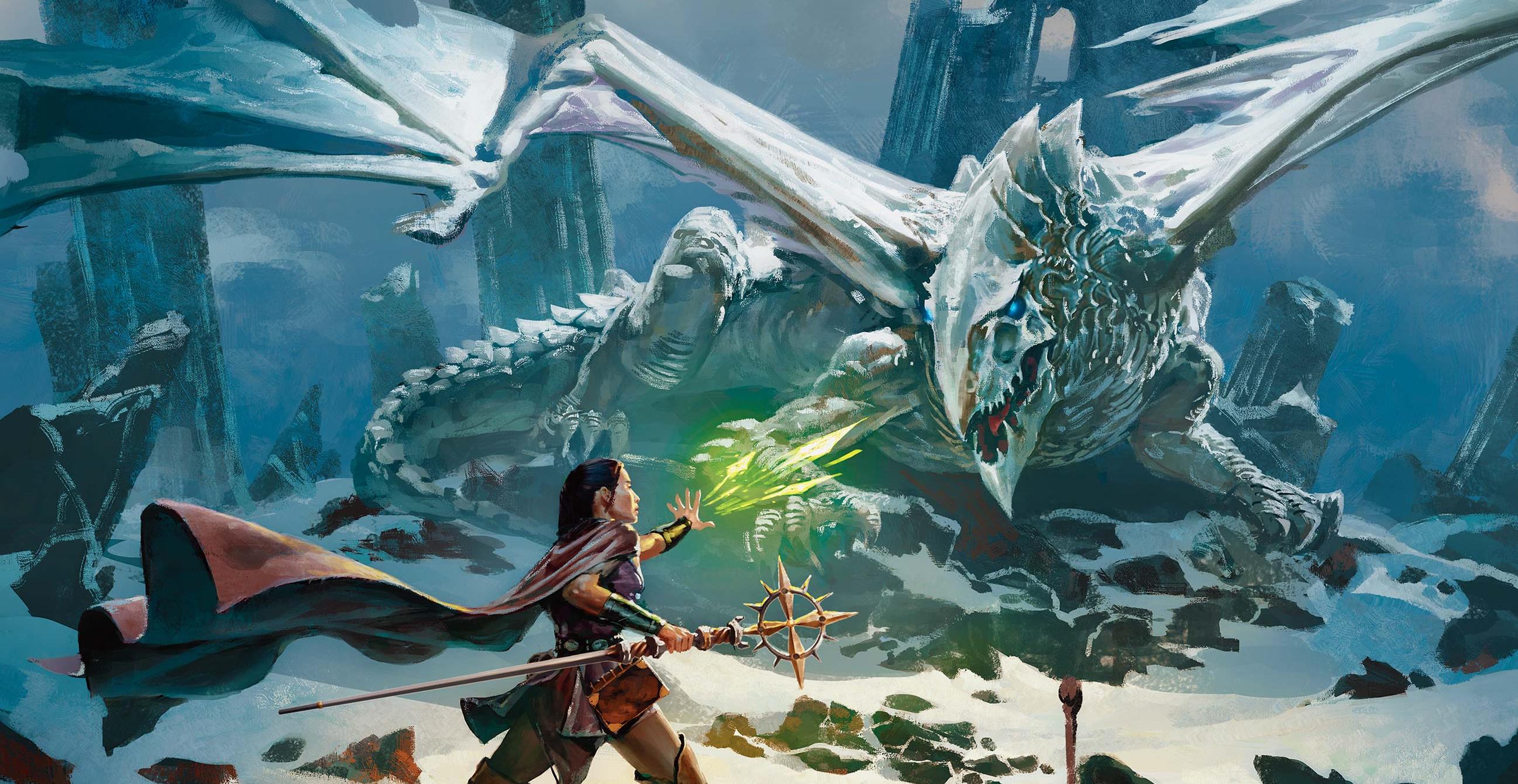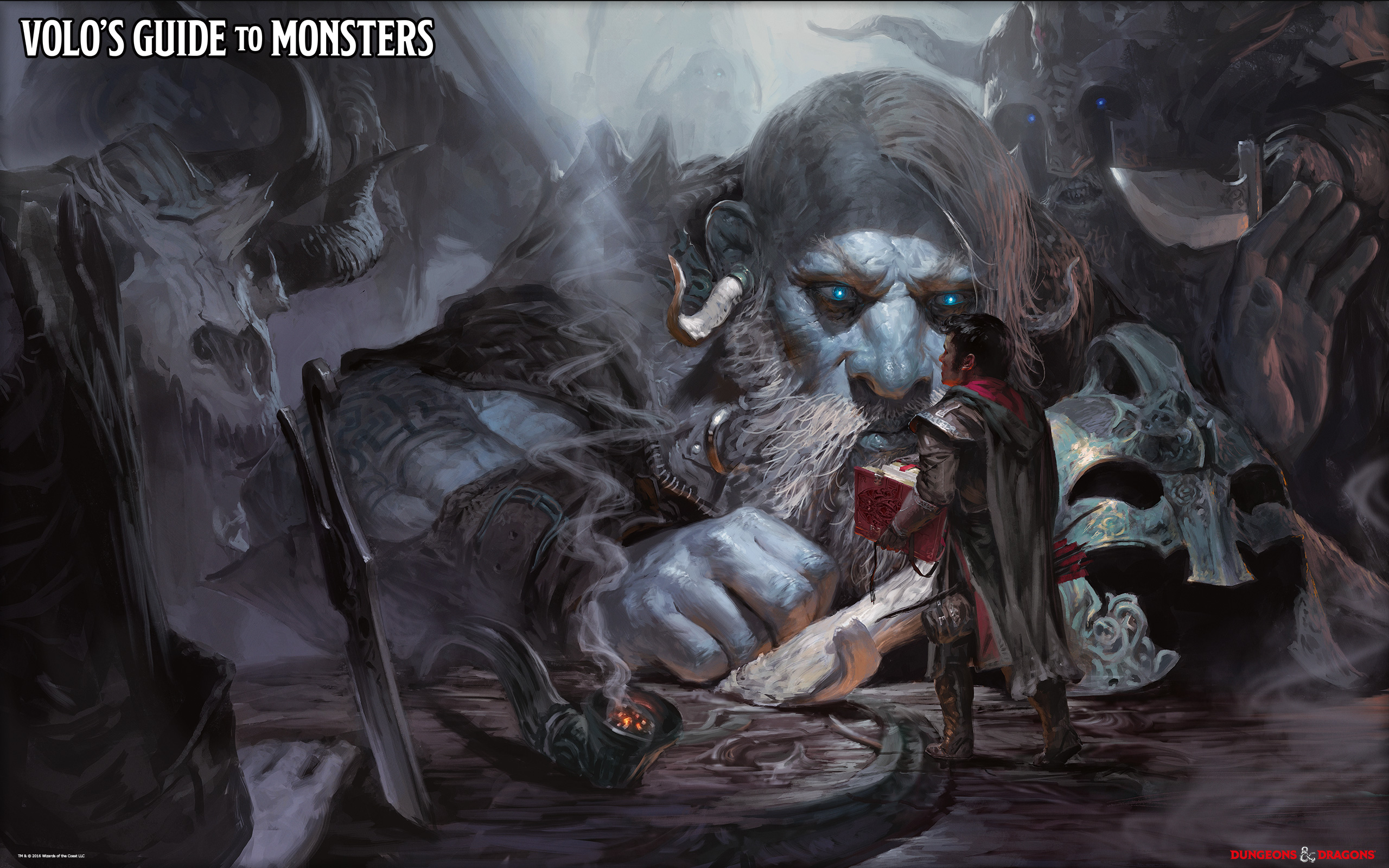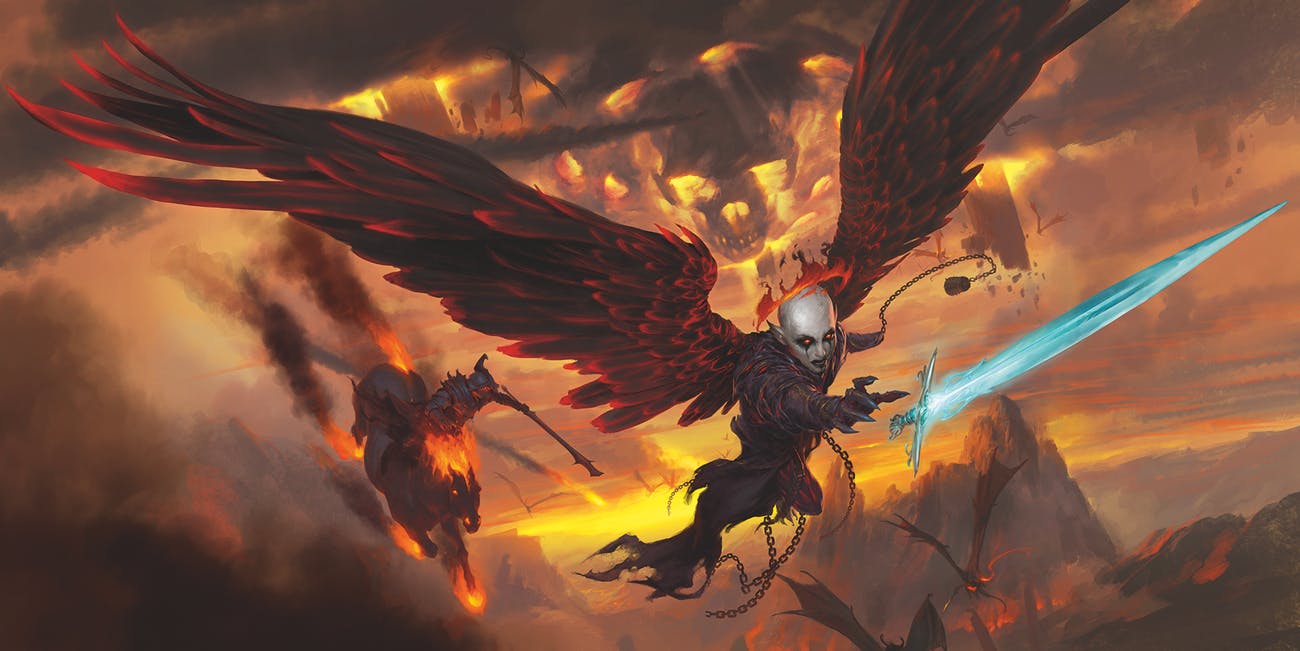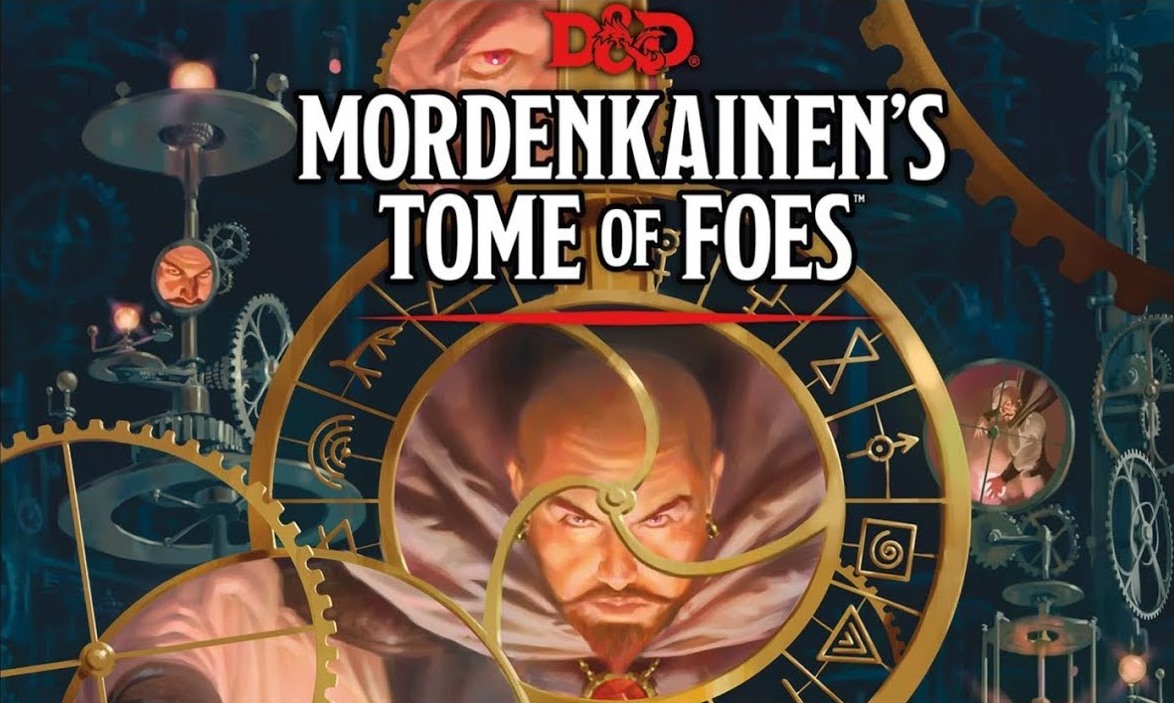

When you head to your friendly local game shop, it can be intimidating to stare at that massive shelf of hardcovers, adventures, guides, pamphlets, DM screens and tons more.
With any tabletop RPG, there’s usually a “core” book as well as a bunch of other manuals, adventures and other fluff. And you don’t know where to start.
Now several years into the release of D&D’s 5th edition, there are dozens of official books. We totally understand how getting into D&D can feel overwhelming.
It’s actually really easy, especially with our guide.
We created a brand new guide for 2022, updated with all the new books and supplements that were released since the last time we wrote about this to help you dive into the wonderful world of Dungeons & Dragons.
Basic Rules. Not sure you want to spend $50 just to try the game? D&D offers the basic rules (the game’s basic classes, backgrounds, equipment and combat/role-playing rules) for free online. Even if you’re playing in a friend’s game, you can create a character using just the free rules. You don’t need anything else. Get it.
The Starter Set. If the game has you interested and you just wanna try it out with some friends without going whole hog, get this box. It has a complete adventure that will take a few sessions to finish, complete character sheets for every player and a book detailing rules for both players and the Dungeon Master. It also has dice. Even if you’ve played D&D before, this will give you a good taste of how the new edition works. It’s also cheap. Get it. (And if regular flavor D&D isn’t your thing, there’s also a Stranger Things-themed starter set and a Rick and Morty-themed one. They’re both great.)
Player’s Handbook. Decided to jump into the game? Then you need this. This is the game’s core rulebook, even if it says “player” on it. Seriously. Even DMs need the Player’s Handbook because it lays out the game’s basic mechanics including combat rules. It outlines the game’s backgrounds, classes, equipment, the entire basic spell list, gods, creatures and the game’s rules for adventuring and combat. Get it.

Player’s Companion. If you’re not satisfied with the background options in the Player’s Handbook, go get this. (It’s also free!) It has four extra backgrounds and a bunch more spells with an elemental flavor. Get it.
Essentials Kit. Similar to the Starter Set, the Essentials Kit has everything you need to play D&D including dice, a rulebook, character sheets and an adventure. It also has helpful cards, a 1-vs.-1 rule system and other stuff that improve the D&D experience. Get it.
Xanathar’s Guide to Everything. In the years since D&D 5e’s initial release, there have been new ideas and additions to the game, and they’re all collected here. If you want more class options, spells or DM ideas, you need this book. There are loads of new character options in the form of new character class archetypes, a host of tools for Dungeon Masters and a giant load of new spells. Get it.

Volo’s Guide to Monsters. This is primarily book for Dungeon Masters, but it does have some player content, too, including options to play as monster classes such as goblins, orcs and others. If you want to play as a monster, you’ll really dig this. (Just check with your DM first to be sure she’s cool with an orc joining the party.) Get it.
Midgard Heroes & Southlands Heroes. Kobold Press is a third-party publisher that has its own campaign setting, Midgard. Together, these books outline more than a dozen new backgrounds including minotaurs and kobolds as well as new backgrounds and other info. Get Midgard Heroes and Southlands Heroes.
Pick up some miniatures. At this point, you’ll be aware of whether your gaming group plays with maps and miniatures or not. (5e can be played with or without.) If you want a mini for your own character, there are tons of options. First, check out the starter set, which features some of the base character class/background options. You could buy boxes of character and monster miniatures. Or if you want something specific, sites such as Reaper, Miniature Market or CoolMiniOrNot will help you out.

Dungeon Master’s Guide. This is the one you need if you’re a DM. While the Player’s Handbook is really the core book, this is the book DMs need if they’re going to run a game. It really drills into the mechanics and little stuff of the game, describing what players can do between adventures, a host of treasure options and tables for doing just about everything (including creating your own dungeons). It also helps create your own adventures, monsters and campaigns. Even if you’re running published adventures, I’d still recommend this book. Get it.
Monster Manual. To run almost any adventure, even the official published ones, you’re going to need the monster stats from this book. It’s non-negotiable. It will also get you tons of ideas. Get it.

There are now so many official hardcover adventure books, you can find just about any kind of story you want to play. This is what I recommend depending on you and your gaming group’s tastes…
Hoard of the Dragon Queen. This is the quintessential D&D adventure: A dragon cult is trying to summon the five-headed dragon goddess Tiamat . This is a great intro adventure that starts at Level 1. Get it.
Wild Beyond the Witchlight. It’s time to step into the Feywild. A mysterious and magical carnival appears, and after attending and meeting its wonderful denizens, the adventurers are whisked away to the Faerie plain for some fun. In addition to an entertaining adventure, this one offers a lot of interesting options such as non-combat ways to end every encounter. Get it.
Waterdeep: Dragon Heist. If you’re tired of dungeon-delving, kingdom-spanning adventures, head to Waterdeep. This one’s a low-level adventure (starts at level 1) based entirely in the city of Waterdeep. It’s about quests, thefts and madcap adventure as you meet and deal with the noble and nefarious citizens of the town. Get it.
Waterdeep: Dungeon of the Mad Mage. A brand new adventure, this one is a dungeon crawl. Taking place in the massive dungeon of Undermountain, the adventure has numerous levels, monsters and traps. It can also take your gaming group all the way to 20th level, the highest tier of D&D. Get it.
Curse of Strahd. You like horror? This is the adventure you want. The ancient vampire Strahd has kept his kingdom, Barovia, in a perpetual state of terror. This adventure is fun and super creepy. Get it.
Storm King’s Thunder. Looking for a more dungeon-crashing, ass-kicking adventure? The giants are messing with the world and they need to be stopped. This is a blast. Get it.
Descent Into Avernus. This is classic, epic D&D. This adventure book features a battle that spans multiple planes of existence and pits regular folks and fantastic beasts against archdevils and gods. There’s a lot to love here, and the adventure (which spans from level 1 to level 13 and beyond) will give your gaming group one epic campaign to enjoy. Get it.
Tales From the Yawning Portal. Want shorter adventures? Or are you an old-time D&D player that wants the classics? Pick up this book. It collects several older adventures — some short dungeons and some longer campaigns — that have been updated to 5th edition including Against the Giants, Tomb of Horrors and White Plume Mountain, among several others. This gives a lot of adventure options. Get it.
Book of Lairs. If you need some one-off adventure options, pick up the Book of Lairs. The book from Kobold Press presents two dozen monster lairs with maps, short adventures, treasure and a ton more. They’re perfect to place in your own campaign or for when you need a quick adventure for game night. Get it.
Ghosts of Saltmarsh. One of my favorite adventure books, it contains five different adventures that you can turn into one long adventure path or pick and choose which you want to use. It’s the D&D book that offers a campaign guide as well as adventures. Get it.
Candlekeep Mysteries. This anthology compiles 16 different one-shot adventures, and it spans adventures from levels 1 to 16. There’s something in this for every gaming group. The basic premise for each adventure is that you’re on a search for a particular missing book from the arcane Candlekeep Library, but the beauty is that you can pick and choose any single adventure to fit your ongoing campaign. (Or just run then as straight-up one-shots!) Get it.

Sword Coast Adventurer’s Guide. Though presented as a book for both DMs and players, it’s really more for DMs looking to take adventurers through the Forgotten Realms, the main setting for D&D. It is by no means an essential book, but it does have some good info if you’re going to be creating your own full adventure or side-treks in the Realms. For players, it also gives extra backgrounds, a few spells and a few extra class options. Get it.
Guildmaster’s Guide to Ravnica. For a bit of a different flavor, check out this sourcebook about Ravnica, the first major 5th edition setting outside of the Forgotten Realms. It takes a deep dive into the world of Ravnica and the guilds and monsters and magic running amok within. Taken from the Magic: The Gathering setting, it’s full of great info and gives a slightly different look at a magical fantasy world than what’s presented in other official D&D offerings. Get it.
Humblewood. Maybe you’re more into owls, foxes and mice more than elves, halflings and orcs. If so, you’ll love Humblewood, a recently released campaign setting full of animals in a mystical forest. Flames ravage the land, destroying the homes of the humblefolk. The core book includes the setting itself as well as 10 new backgrounds, new spells and backgrounds, character standees, maps and a full adventure. Get it.
Tausha’s Cauldron of Everything. Not an adventure or a bestiary, Tausha’s is a supplement to the Player’s Handbook and the Dungeon Master’s Guide. Containing a brand new character class — the Artificier — as well as multitude of new character subclasses, spells, magic items and Dungeon Master tools, this book feels like the

Volo’s Guide to Monsters. Remember this one? We talked about it from a player’s perspective, but it’s a great book for DMs, too. It provides a bunch of new monster stats to supplement the Monster Manual. It also gets in-depth about specific monster types, so you can craft your own dungeons and adventures based on stuff like orcs and beholders. This thing is deep. Get it.
Mordenkainen’s Tome of Foes. Much like Volo’s Guide, this book is primarily a monster book, and it introduces dozens and dozens of brand new monsters, most of them geared specifically toward high-level campaigns. There’s also some lore here, mapping out new info on demons, devils, elves, drow, dwarves, duergar, gith, gnomes and halflings that you can use to craft new adventure ideas. Get it.
Mordenkainen Presents Monsters of the Multiverse. Every official D&D adventure book and expansion contains new monsters, and before this book, you’ only gain access to every single one of those of those monstrous stat blocks by buying every single book. Until now. Monsters of the Multiverse compiled every single monster (and their artwork and updated stats) to date in one place. It’s so much easier to bring to the table. Get it.
Tome of Beasts. If you think there aren’t enough monsters in the Monster Manual, this is what you need. It details more than 400 new monsters for 5th edition. It’s massive. It’s awesome. Get it.
Creature Codex. Even more monsters, yo! Yet another monster supplement, this one details nearly 400 new monsters for 5th edition including new dragons, new demons, new angels, new undead and new elemental lords. Again, this one’s huge and fantastic. Get it.